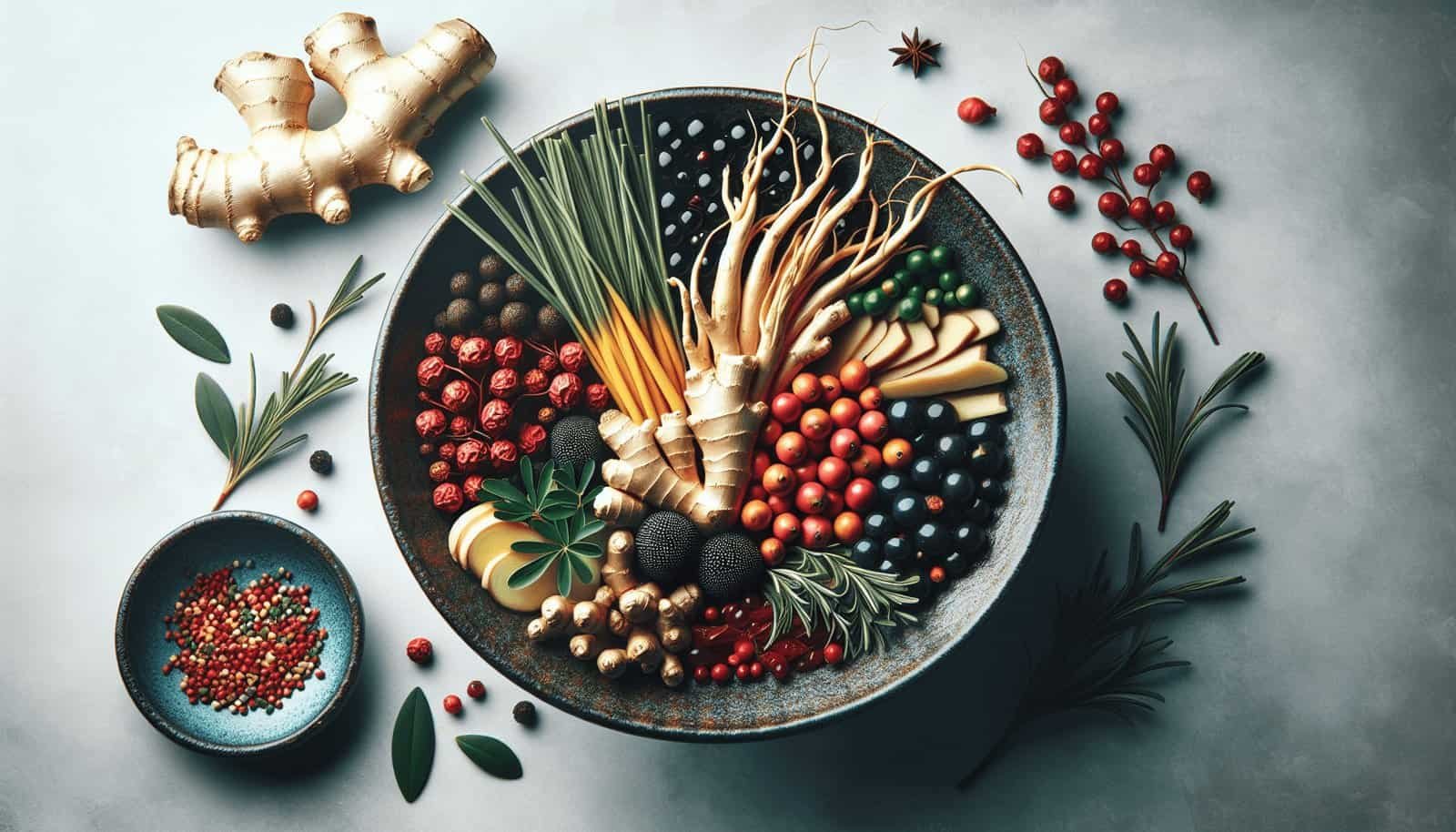Sure, I’d be happy to help!
Are you ready to elevate your culinary skills and improve your wellness with the vibrant flavors of Korean cuisine? This article delves into some exciting, trending recipes that seamlessly blend medicinal herbs into traditional Korean dishes. You’ll discover how to infuse your meals with the healing properties of ginseng, ginger, and other herbs, bringing a whole new dimension to your cooking. Embrace this delightful journey and transform your everyday meals into nourishing experiences that delight both the palate and the soul.
Can You Recommend Trending Recipes For Incorporating Medicinal Herbs Into Korean Dishes?
Have you ever wondered how you can boost your meals’ nutritional value while savoring the amazing flavors of Korean cuisine? Adding medicinal herbs to your recipes might be the perfect solution! Known for their health-enhancing properties, medicinal herbs can enliven your traditional Korean dishes, making them even more delicious and nourishing.

Why Incorporate Medicinal Herbs?
Medicinal herbs are renowned for their health benefits. From boosting your immune system to alleviating digestive issues, these herbs can play a major role in maintaining and enhancing your health. Korean cuisine, with its rich history of utilizing natural ingredients, is an excellent medium to incorporate these beneficial herbs without compromising on taste.
Popular Medicinal Herbs in Korean Cuisine
Before we delve into the recipes, let’s get acquainted with some medicinal herbs that are commonly used in Korean cooking:
| Herb Name | Korean Name | Benefits |
|---|---|---|
| Ginseng | 인삼 (Insam) | Boosts energy, relieves stress, enhances immunity |
| Mugwort | 쑥 (Ssuk) | Aids digestion, improves circulation |
| Red Dates | 대추 (Daechu) | Enhances blood health, provides antioxidants |
| Korean Mint | 미나리 (Minari) | Improves digestion, detoxifies the body |
| Schisandra | 오미자 (Omija) | Boosts liver health, reduces stress |
Recipe 1: Ginseng Chicken Soup (Samgyetang)
Ginseng Chicken Soup, also known as Samgyetang, is a traditional Korean dish believed to have rejuvenating properties. It’s perfect for those who need an energy boost.
Ingredients:
- 1 whole young chicken
- 4-6 cloves of garlic
- 1/4 cup of glutinous rice, soaked for 1 hour
- 3-4 ginseng roots
- 2 dried jujubes (optional)
- 5-6 chestnuts (optional)
- 5-6 gingko nuts (optional)
- 1 small Korean radish
- Salt and pepper to taste
- 1 green onion
Instructions:
- Clean the chicken thoroughly and remove any remaining innards.
- Stuff the chicken cavity with garlic, soaked glutinous rice, ginseng roots, jujubes, chestnuts, and gingko nuts.
- Place the stuffed chicken in a large pot. Fill the pot with water until the chicken is completely submerged.
- Add the radish to the pot and bring it to a boil.
- Reduce the heat and simmer for about 1.5 to 2 hours, until the chicken is tender.
- Season with salt and pepper, and garnish with chopped green onion.
Recipe 2: Mugwort Soup (Ssukguk)
Mugwort Soup, also known as Ssukguk, is a comforting and nourishing dish ideal for a healthy diet.
Ingredients:
- 1 bunch of fresh mugwort (or 1 cup of dried)
- 2 cups of anchovy broth
- 1/2 block of tofu, diced
- 1 small onion, chopped
- 2 cloves of garlic, minced
- 1 tbsp soybean paste (doenjang)
- Salt and pepper to taste
Instructions:
- Rinse the mugwort thoroughly and chop it into manageable pieces.
- In a large pot, bring the anchovy broth to a boil.
- Add the chopped onion and garlic, and cook until softened.
- Stir in the soybean paste (doenjang) until it is fully dissolved.
- Add the diced tofu and chopped mugwort to the pot.
- Simmer for about 20 minutes, or until the mugwort is tender.
- Season with salt and pepper to taste.

Recipe 3: Red Date Tea (Daechu-cha)
Red Date Tea is a popular Korean beverage known for its sweet and soothing taste, as well as its health benefits.
Ingredients:
- 10 dried red dates (jujubes)
- 5 cups of water
- 2 tbsp honey (optional)
- 1 small piece of ginger (optional)
Instructions:
- Rinse the red dates in cold water.
- In a medium pot, combine the red dates and water.
- Bring to a boil, then reduce the heat to low and simmer for about 1 hour.
- If using, add a small piece of ginger to the pot for extra flavor and let it simmer along with the red dates.
- Strain the tea into cups and sweeten with honey if desired.
Recipe 4: Korean Mint Salad (Minari Muchim)
Korean Mint Salad is a refreshing dish that aids in digestion and detoxifies your body.
Ingredients:
- 1 bunch of Korean mint (minari)
- 2 cloves of garlic, minced
- 1 tbsp soy sauce
- 1 tbsp rice vinegar
- 1 tbsp sesame oil
- 1 tsp sugar
- 1 tsp sesame seeds
- Red chili flakes, to taste
Instructions:
- Rinse the Korean mint thoroughly and chop it into bite-sized pieces.
- In a large mixing bowl, combine the garlic, soy sauce, rice vinegar, sesame oil, sugar, and chili flakes.
- Toss the chopped Korean mint in the dressing until well coated.
- Garnish with sesame seeds before serving.

Recipe 5: Schisandra Berry Tea (Omija-cha)
Schisandra Berry Tea is a traditional Korean tea that is both delicious and beneficial for stress reduction and liver health.
Ingredients:
- 1/2 cup dried schisandra berries
- 6 cups of water
- 1 tbsp honey (optional)
- Lemon slices for garnish (optional)
Instructions:
- Rinse the schisandra berries and place them in a medium pot with water.
- Bring to a boil, then reduce the heat and simmer for about 1 hour.
- Strain the berries and pour the tea into cups.
- Sweeten with honey if desired, and garnish with lemon slices.
Final Thoughts
Incorporating medicinal herbs into your Korean dishes can be a rewarding experience, not just for your taste buds but also for your overall health. From boosting your immune system to aiding digestion, these herbs add more than just flavor to your meals. Plus, with the wide variety of herbs and recipes available, you can enjoy a rich and diverse culinary journey.
So why not give these recipes a try? Your body and taste buds will thank you! And who knows, you might just discover a new favorite dish!

